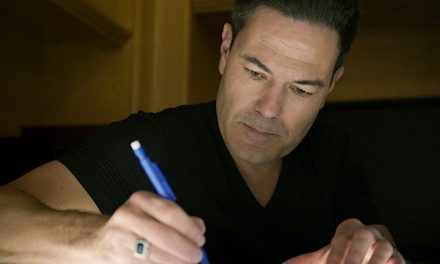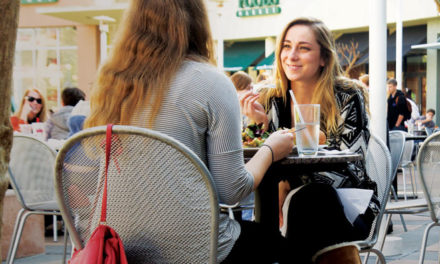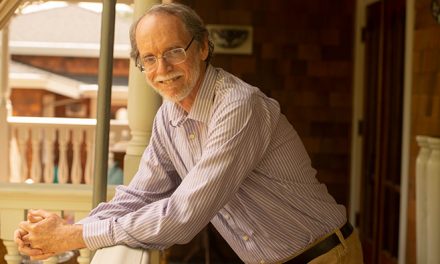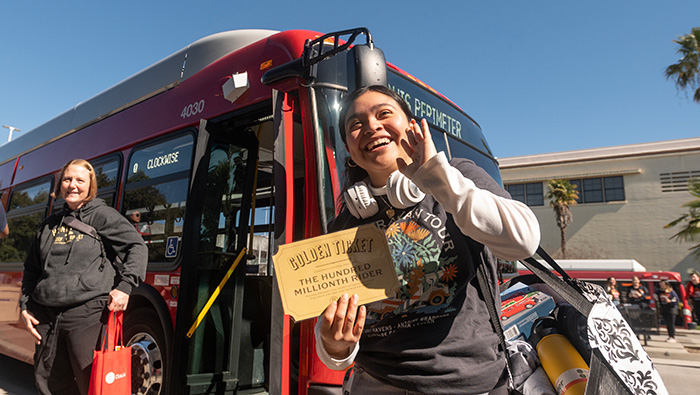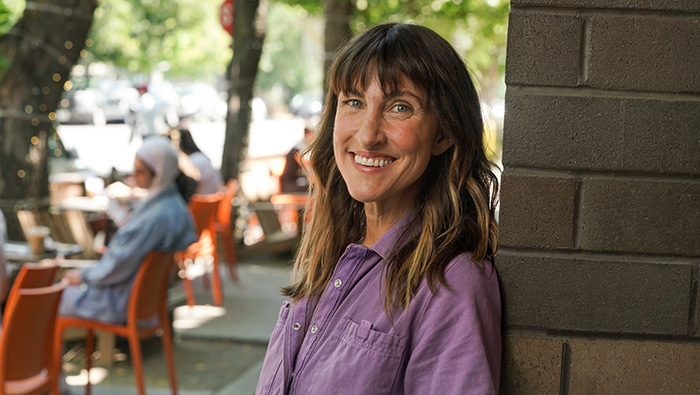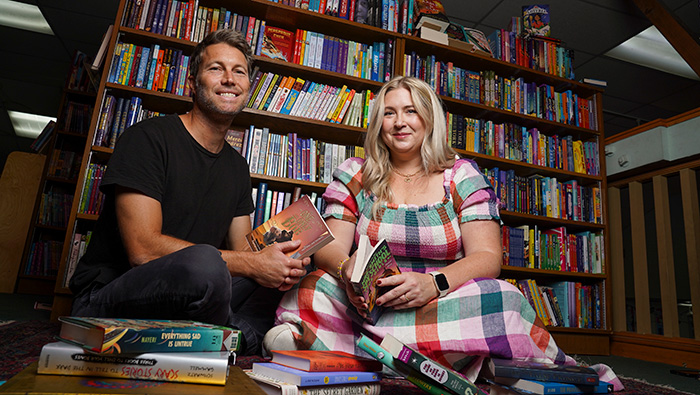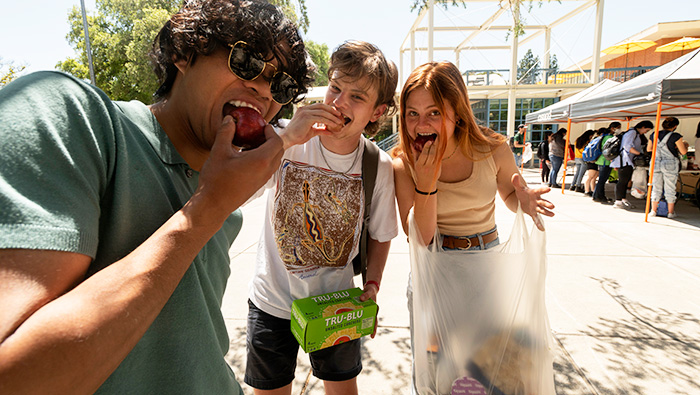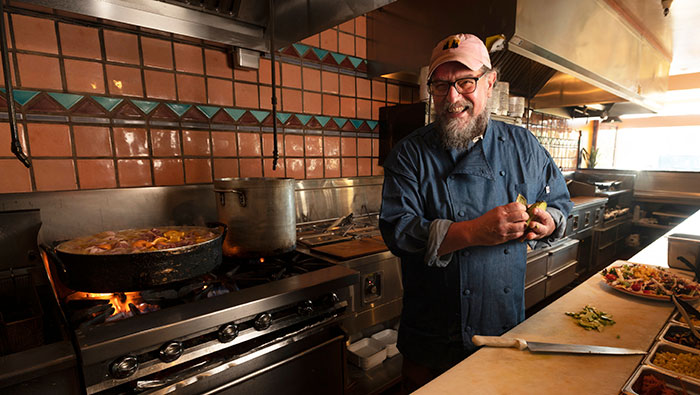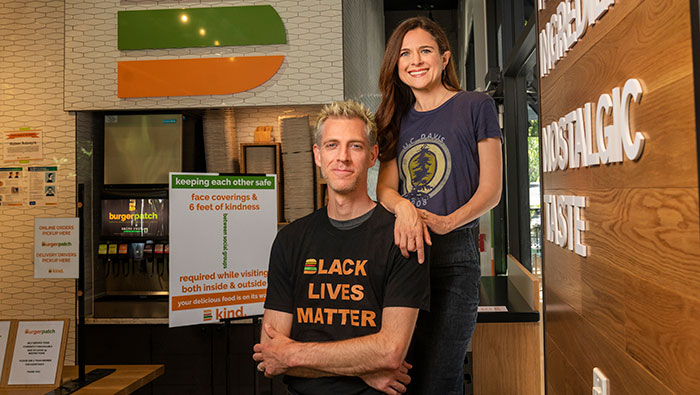
Burger Patch owners Phil and Danea Horn opened their Davis outpost in late June.
Karin Higgins/UC Davis
Smart Business
Running a small business is tough enough on its own. But the COVID-19 pandemic has presented historic challenges in keeping doors open and managing events. Owners have scrambled to adapt their business practices as social distancing, sheltering in place and other measures have been enacted to prevent the spread of COVID-19.
Through these difficult economic times, many small-business owners have shown remarkable creativity, resiliency and care for the community. That’s especially true of some businesses and organizations that are overseen by alumni.
Solomon’s Delicatessen in Sacramento was just starting to hit its stride in March as California started to shut down. Co-founded by Andrea Lepore ’92, the Jewish delicatessen pays homage to Tower Records founder Russ Solomon and is housed in a former Tower Records.
But less than a year after opening, Solomon’s Delicatessen closed due to the COVID-19 pandemic. Staying open for takeout wasn’t sustaining the restaurant enough, but Lepore and her crew were still determined to feed people.
In this case, Solomon’s Delicatessen teamed with the nonprofit Sacramento Covered to run a community kitchen. The chefs got to work, cooking breakfast burritos, pastas and other dishes that would be distributed to vulnerable populations throughout the Sacramento area. Over the course of 10 weeks, nearly 20,000 meals were cooked in this community kitchen.
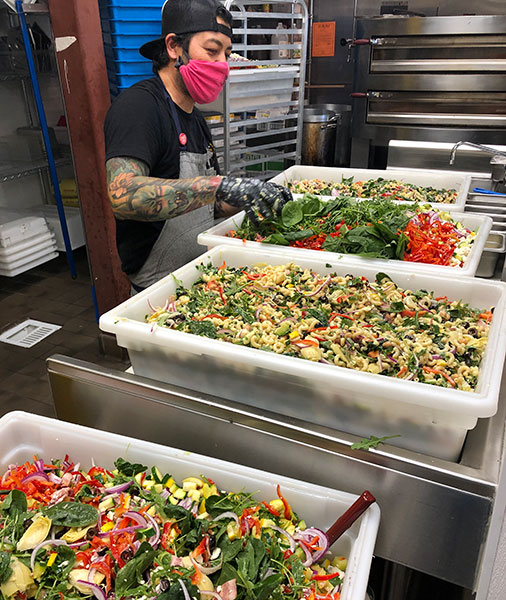
Solomon’s Delicatessen transformed into a community kitchen to provide nearly 20,000 meals over 10 weeks in the spring. (Courtesy)
Solomon’s Delicatessen has since returned to fairly regular operations, offering takeout meals and patio dining.
“We didn’t know what to expect, so we just dove in,” said Lepore. “We heard there was a need for a kitchen to feed the community. We thought, ‘We have a kitchen, and we have employees who need work.’ I think everyone in all these communities across the world are looking for ways to help. Some make masks, some distribute food. You do what you can do.”
Danea Horn, a UC Davis Ph.D. student in agricultural and resource economics, said she never expected to open the Davis location of her Burger Patch restaurant during a public health crisis. With her husband, Phil Horn, she co-founded the business, which features a menu of plant-based burgers and vegan comfort foods.
Their midtown Sacramento location opened in 2019, and the couple planned to open its location at Davis Commons during Picnic Day weekend of 2020. The COVID-19 pandemic forced them back to the drawing board, and the eatery finally opened in late June following a series of preview events.
“We were overwhelmed by the support of the community and that’s continued through the pandemic,” said Danea Horn. “In retrospect, we ended up with a business model where we were able to adapt quickly. We had online ordering, we were signed up with DoorDash and other [food delivery] apps. In the customer’s mind, we were already a good take-out option.”
Though the future is filled with uncertainties in the era of COVID-19, the couple said they hope to open more Burger Patch locations.
“I was saying to my husband that I think the economy in the next six months will be an education about things going forward,” said Horn. “With midtown [Sacramento] and Davis having strong openings, there’s still a demand for what we do. It’s all been an education in learning to be dynamic.”
Meanwhile, the organizers of the Davis Shakespeare Festival needed to find an entirely new stage.
The annual festival was set for July, and this year was set to be extra special. The festival is celebrating its 10th anniversary, and the Davis Veterans Memorial Center was ready to host three productions. But once the COVID-19 pandemic hit, the curtain went down on the entire festival.
“We had just finished casting the whole thing and that takes a while,” said Gia Battista ’11, one of the festival’s founding artistic directors. “The scenic design and the set design was well underway. It was just a big blow.”
The live productions will have to wait for another time, but the festival organizers were determined to share their love of Shakespeare and theater arts. So they switched to Zoom.
The Davis Shakespeare Festival also hosted online reading groups and a series of youth workshops.
“The reading groups are a cool way to connect with the community,” said Battista. “They make Shakespeare accessible and fun, like a book club with a little more guidance. Actors have come in to read scenes and guest speakers share insights.”
The youth workshops were an online extension of the festival’s Camp Shakespeare, which is normally held each summer in the UC Davis Arboretum. Participants play theater games, explore the works of Shakespeare, learn principles of set design and engage in other theatrical activities.
During this time of social distancing, the festival is also sponsoring a digital internship program. More than 100 applications arrived from around the country, with 18 interns making the final cut.
Overall, 2020 has been a lesson in perseverance for the festival. Battista said the year reminds her of a quote from Much Ado About Nothing: “This wedding day perhaps is but prolonged. Have patience and endure.”

